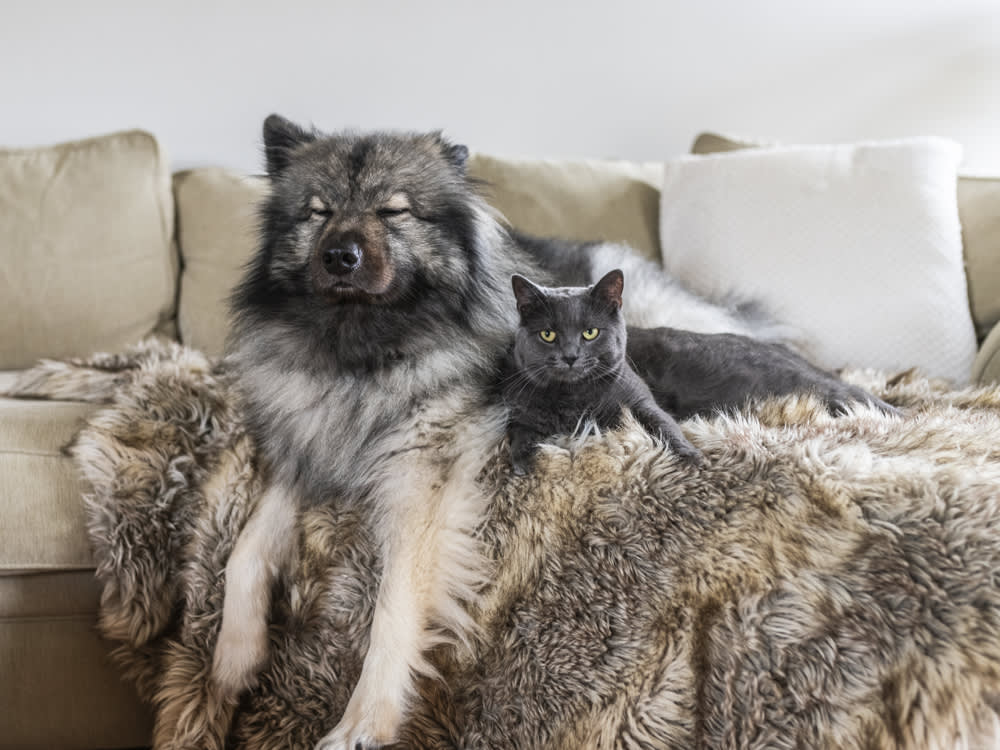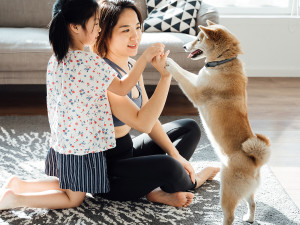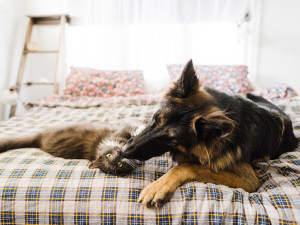The Pros & Cons of Adding a Second Pet to the Family
Double trouble or double the fun? Dog trainer Lindsay Hamrick weighs in

Share Article
So, you’re thinking about adding another cat or dog to your home. Cats and dogs are social animals who, when the circumstances are right, benefit from being with other pets. Here are the pros and cons of getting a second animal to help you know if this decision is right for you and your resident pet.
Pros of getting a second pet
1. Your resident cat or dog might need a friend
Many people consider adding a second pet when they think their resident pet is bored, stressed or lonely. Consider this; is your pup social with other dogs or cats? Do they love playing with dogs and have some experience meeting new dogs while out on walks or at doggie daycare? Has your cat ever lived with another pet before?
While some animals who have never had a housemate may come around to the idea of a new friend, it’s more likely to be successful if your pet has already shown some interest in other animals. Maybe your dog doesn’t love the company of other dogs but might do well with a new kitten, or maybe your senior pet might like having another geriatric join them at the retirement home. If you travel often or work longer hours, adding a second pet may reduce some boredom or stress for your dog or cat – and if you board your pets, letting them live together at a facility can ease fears they may have in a new environment.
A note about separation anxiety: if you’re thinking of getting a new puppy for your dog with severe separation anxiety, be sure to consult with a vet, behaviourist or professional dog trainer first. While the company of others may help, it won’t solve the root of what’s causing severe anxiety or destructive behaviours, and you could end up with two dogs with behavioural challenges instead of one.
2. Your pet could be a great role model for a young animal
If your dog or cat is a model citizen, social with people and other animals and well-behaved, they will likely be a great role model for a young puppy or kitten, or a fearful animal learning to come out of their shell. One of the best pairings of animals are shy or insecure cats and dogs who are given an older, confident and social friend to learn from; in fact, you’ll see many adoption profiles for homeless pets who are looking for just this match.
3. A new pet could brighten a senior pet’s days
Many people consider adding an animal when their pet is older. With the right match, this can help your senior pet find a bit more bounce in their step. Just be prepared to do a very slow introduction so as not to stress out either pet, and decide ahead of time what you’ll do if the match doesn’t work out. If you think you may want to add a companion for your senior pet, be sure to do this before major medical issues arise. Changing their environment significantly with the addition of a new pet can be a major stressor.
4. It may give you back some time
Having a playmate for your cat or dog helps them release some of their energy on their newfound friend. One-on-one time with each pet will continue to be important, but anyone who has adopted a pair of kittens will tell you it’s not only hilarious to watch them wrestle, but it keeps those nails off of you for a few sweet minutes.
Cons of getting a second pet
1. Not everyone will get along
As much as we try to blend dogs with dogs or cats with cats or a combo of both, some animals just don’t like each other. Like us, pets have preferences, and sometimes we don’t know what those preferences are until we realise our resident pet is less happy with the new kitten than being by themselves.
You can set everyone up for success by introducing them slowly over the course of weeks (not days) and by being deliberate about the kind of pet you think might work best. Adopting a young, exuberant puppy who will jump all over your arthritic, senior dog may not lead to the kind of bond you were hoping for. Some of our favourite pet combos include:
A lazy, older pet with a similar cat or dog.
A rambunctious adolescent dog or cat with a confident, older role model.
A social butterfly with a slightly fearful pet to help them learn the ropes.
An independent, picky pet with a goofy, won’t-take-things-too-seriously pet.
2. It��’s more expensive
According to Statista's 2022 estimated annual costopens in new tab of keeping pet dogs in the UK, owners spend an average of £1,875 on their dog each year and £1,200 on their cat. While costs differ depending on the animal’s needs, you can expect to spend double on veterinary costs (vaccinations, preventative care, emergency care etc), food, grooming, boarding and pet sitting, training and toys.
3. Two pets may take twice the time to care for
While some pet chores can be done as quickly with one pet as two, consider how you’ll exercise a second dog. Will two be too much to walk together and you’ll need to schedule separate outings? What if they don’t play together and rely on you for playtime? Even if two pets love to wrestle or chase, it’s still important to spend one-on-one time with each in order to maintain a strong bond.
4. It won’t be as easy to travel, move or transition your life
While it might be simple to pack up your Labrador’s things and hit the beach for the weekend, it’s less easy with two dogs. With three dogs in my pack, I rotate their outings: the tiny one joined me on a 10-day road trip to see family this summer because she’s the easiest to bring to new houses and doesn’t take up much room in the car; whilst one of the big ones came along on a beach holiday with me. The third dog is an excellent conference dog, snuggling up to attendees and napping through sessions, so she joins me anytime I’m presenting or attending a conference. Remember: each pet has their preferences and strengths. Having more than one means fulfilling their individual needs.
If you’re a renter, it gets exceedingly difficult to find a pet-friendly option when you have more than one pet. If you anticipate needing to move in the near future, it may be worth holding off until you’re in a new place and then asking if you can add another pet. If you’re single and looking to start a relationship with someone, consider that they may have a pet of their own (we can only hope), and it may be easier to introduce only one pet to their crew.
5. It might change the bond you have with your current pet
Are there any oldest children out there? Remember when you had all your parents’ attention and then they brought home your sibling? It’s not much different for our pets. Things will likely change – particularly in the first few months when you’re getting to know the new pet, taking them to training class or spending extra time playing with them. Be sure to schedule one-on-one time with your resident pet in the short and long-term to help ease them through the transition.
Adding a second (or third, or fourth…) pet can be a wonderful experience, but it can also come with challenges. Make a plan, be deliberate, ask your local shelter for help in matchmaking and you’ll be well on your way to filling your home with an extended pet family.

Lindsay Hamrick, CPDT-KA
Lindsay Hamrick lives in New Hampshire with her three dogs, chickens, and an assortment of rotating foster animals. She forces her elderly chihuahua, Grandma Baguette, on overnight backpacking trips, can diaper a lamb with one hand, and while she’s a long-time Certified Professional Dog Trainer, 66.7% of her dogs still won’t lay down when asked.
Related articles
![A German shepherd and cat play affectionately in a bed.]()
The Real Differences Between Cats and Dogs
There’s no winning this argument, but here’s what you should know about parenting each perfect pet
Why Is My Cat Hiding?
No, they’re not on the lam. Here are four reasons your cat might be MIA
![Dog looking out of a red half-door]()
How to Stop Your Escape-Artist Dog From Making a Getaway
Dog trainer Pat Miller’s pro tips for preventing your pup from darting out the door
![Sad boxer rests on owners lap, dog doesn't want to be touched]()
Don’t Ignore These 9 Behavioural Signs That Your Dog Is in Pain
Animal behaviourist Karen B London breaks down the silent ways your pet is trying to tell you they’re hurting
![A woman and a dog laying close together on a couch.]()
Paging Dr Doggo
Your pup may know you’re sick before you do
![Puppy hides under the couch in fear]()
How to Keep Your Dog From Freaking Out When You Have Company
Do these things to help your pup (and your guests) feel chill









